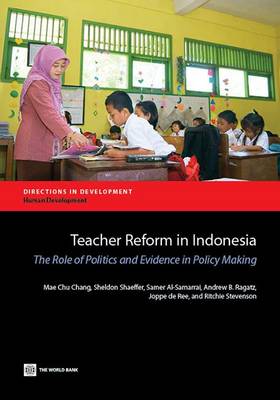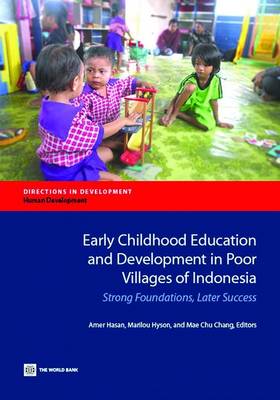Directions in Development. Human Development
2 total works
Teacher Reform in Indonesia
by Mae Chu Chang, Susiana Iskandar, Andrew B. Ragatz, Joppe de Ree, Samer Al-Samarrai, and Sheldon Shaeffer
Published 18 December 2013
The book features an analysis of teacher reform in Indonesia, which entailed a doubling of teacher salaries upon certification. It provides a description of the political economy context in which the reform was developed and implemented and an analysis of the impact of the reform on teacher knowledge, skills, and student outcomes.
It includes a randomised control trial over time with data representative of approximately 50 percent of the country's primary and junior secondary schools and a time-on-task analysis of a representative sample of classroom teaching practices linked to the TIMSS results and financial implications.
It includes a randomised control trial over time with data representative of approximately 50 percent of the country's primary and junior secondary schools and a time-on-task analysis of a representative sample of classroom teaching practices linked to the TIMSS results and financial implications.
Early Childhood Education and Development in Poor Villages of Indonesia
by Amer Hasan, Marilou Hyson, and Mae Chu Chang
Published 30 July 2013
Indonesia has begun to emerge into middle-income status, yet persistent poverty and stark inequalities continue to affect young children's development. This book tells the story of Indonesia's efforts to change the trajectory of development for poor children. Many countries have similar aims, but several aspects of what is reported here are especially valuable and perhaps unique:
The study offers data on all aspects of health and development in a sample of rural young children, collected with internationally-validated measures, as well as household information, information about parenting practices including feeding patterns, parent questionnaires, and data on the prevalence and distribution of ECED services.
The data reported in this book is based on a sample of more than 6,000 Indonesian children living in 310 poor villages, including two age cohorts (aged 1 and 4 years old when data were first collected on their development in 2009).
From the start, the project aimed not only to support service provision but also to support the development of national standards, build national and district capacity, and encourage the establishment of a system of ECED quality assurance, efforts that are still in process.
Few such analyses have been done with such a large sample and with multiple measures. These design features allow a high level of confidence in the results that are reported. The lessons from this book will help to inform not only this project's further implementation but ECED initiatives in Indonesia and around the world.
Thus, the results presented in this book are of significance for researchers, policy-makers, and practitioners within and beyond Indonesia. The experiences and research results discussed here are especially relevant for:
The study offers data on all aspects of health and development in a sample of rural young children, collected with internationally-validated measures, as well as household information, information about parenting practices including feeding patterns, parent questionnaires, and data on the prevalence and distribution of ECED services.
The data reported in this book is based on a sample of more than 6,000 Indonesian children living in 310 poor villages, including two age cohorts (aged 1 and 4 years old when data were first collected on their development in 2009).
From the start, the project aimed not only to support service provision but also to support the development of national standards, build national and district capacity, and encourage the establishment of a system of ECED quality assurance, efforts that are still in process.
Few such analyses have been done with such a large sample and with multiple measures. These design features allow a high level of confidence in the results that are reported. The lessons from this book will help to inform not only this project's further implementation but ECED initiatives in Indonesia and around the world.
Thus, the results presented in this book are of significance for researchers, policy-makers, and practitioners within and beyond Indonesia. The experiences and research results discussed here are especially relevant for:
- Researchers in early childhood development and programme evaluation;
- Policymakers within and beyond Indonesia;
- Providers of early childhood services;
- Professional development providers;
- Advocates for quality early childhood services.

